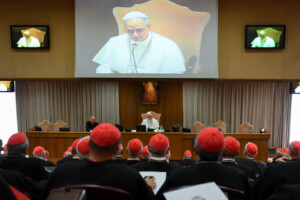Pope Leo XIV is taking a decisive stance on artificial intelligence, describing it as “a threat to human dignity, justice, and labor” during his inaugural address as the leader of the Catholic Church.
The new pontiff is prioritizing AI in the Church’s moral framework, cautioning that humanity is on the brink of a new industrial revolution that presents similar dangers to workers and human rights as those seen over a century ago.
“In our current era… advancements in artificial intelligence introduce new challenges,” Leo stated while addressing the College of Cardinals on Saturday in the New Synod Hall.
He invoked the legacy of Pope Leo XIII, who in 1891 published Rerum Novarum, a pivotal document of Catholic social teaching responding to the human impact of the Industrial Revolution.
 Pope Leo XIV engaging with the College of Cardinals in the New Synod Hall at the Vatican (AP)
Pope Leo XIV engaging with the College of Cardinals in the New Synod Hall at the Vatican (AP)
Background
Pope Leo XIV’s comments come amid rising global concerns regarding AI’s impact on the economy, warfare, and media trustworthiness. This address follows closely after:
Pope Francis, who passed away on Easter Monday at the age of 88, had increasingly raised alarms about the ethical dilemmas posed by AI, particularly in military contexts, where he cautioned against a “disconnect from the great tragedy of war.”
By addressing AI early in his papacy, Pope Leo XIV signals a commitment to deepen and intensify the Vatican’s role in shaping global ethical discussions about technology.
Conclusion
The Catholic Church has officially brought artificial intelligence onto its ethical agenda. Pope Leo XIV emphasizes that spiritual leadership must evolve alongside technological advancements.









